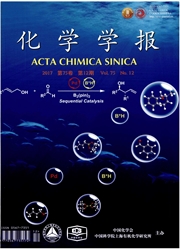

 中文摘要:
中文摘要:
Zn^2+是多种酶和转录因子的必要成分,在生物体内起着重要的作用,检测Zn^2+具有十分重要的生物学意义.我们合成了一种新型近红外荧光探针TAEA-IR-780,该探针通过配位作用与Zn^2+结合后,荧光显著增强.通过质谱和氢谱对该探针进行了表征,并探讨了pH值、其它金属离子对Zn^2+检测的影响.该探针的激发波长为683nm,发射波长为750nm,可避免对生物活体的损伤,同时生物体内常见的金属离子对其干扰较小.该探针对Zn^2+的检测下限达1.0×10^-9mol·L^-1,具有较高的检测灵敏度.
 英文摘要:
英文摘要:
Zn^2+ is an essential component for many enzymes and transcription factors, in which it plays structural or catalytic roles, so its detection is of great biological significance. The development of novel near-infrared fluorescent probe for Zn^2+, TAEA-IR-780, was described in this paper, which was obtained by directly attaching an acceptor, tris(2-aminoethyl)amine (TAEA), to a near-infrared fluorophore IR-780. The excitation and emission wavelengths of the TAEA-IR-780 are 683 and 750 nm, respectively, and its fluorescent intensity increases with the addition of Zn^2+ under physiological condition (pH=7.4) and the detection limit reaches 1.0 × 10^-9 moloL-1. Moreover, the fluorescent intensity of TAEA-IR-780 does not increase noticeably in the presence of other biologically important cations such as Ca^2+ and Mg^2+. The results show that the probe can not only effectively minimize cell damage and autofluorescence by excitation light but also afford sufficient sensitivity and selectivity for the biological detection of Zn^2+.
 同期刊论文项目
同期刊论文项目
 同项目期刊论文
同项目期刊论文
 期刊信息
期刊信息
